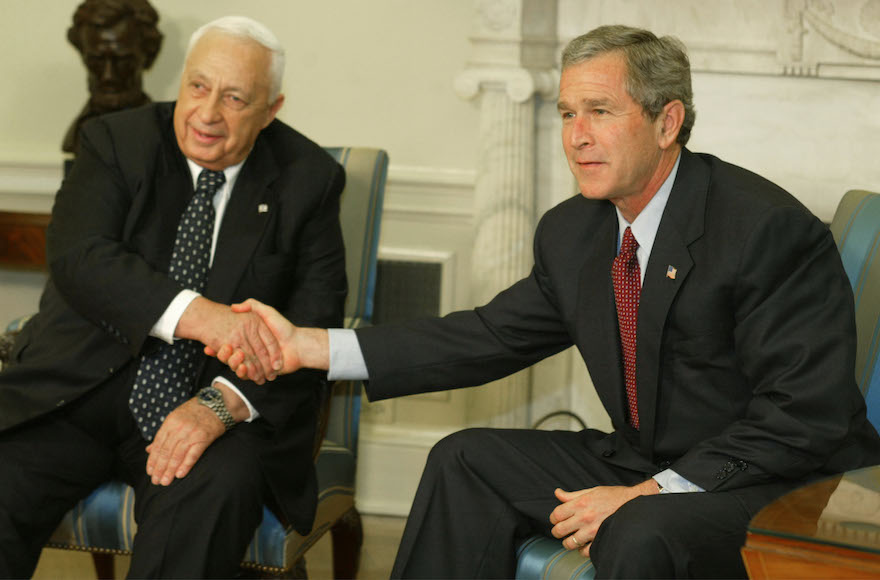Israel turns 70 this year. To mark the anniversary, JTA’s Ron Kampeas describes the U.S.-Israel friendship through portraits of all 13 presidents who have been in office during the Jewish state’s history. For other articles in the series, click here.
To get this unique look at Israel & the Presidents directly in your inbox, sign up here.
(JTA) — The 9/11 terrorist attacks in 2001 seemed for Israelis to be a turning point in U.S. foreign policy, burying once and for all the American realist strain that posited engagement with bad actors as a dirty but necessary statecraft. George W. Bush’s “with us or against us” approach to the war on terrorism, his very coinage of the term “war on terrorism,” was music to the ears of Israelis who for years had said that partners in peace must renounce absolutist demands and absolutist means to achieve them.
Bush extended his outlook to the Israeli-Palestinian conflict. Relaunching the peace process with his “road map” in 2002, one explicit condition was that he would no longer deal with Yasser Arafat, who had steered his PLO factions into participating in the bloody second intifada.
“The Jewish community started to see a resolve for promoting peace by motivating the Palestinians to take good actions rather than starting with Israeli concessions,” Jay Lefkowitz, a former Bush White House policy adviser, told JTA in 2004.
The same year, Bush made history when he recognized some Israeli claims to the West Bank. His vision of a new Middle East borrowed much from Natan Sharansky’s 2005 book, “A Case for Democracy.”
Bush also never demanded that Israel hew to standards he would not: Once the United States launched targeted killings against suspected terrorists, the Bush administration put an end to State Department statements condemning Israel for doing the same.
In his second term, during Israel’s 2006 war with Hezbollah, Bush overrode his secretary of state, Condoleezza Rice, who was pressuring Israel to end the war before it was ready to do so.
“It is important to remember this crisis began with Hezbollah’s unprovoked terrorist attacks against Israel,” Bush said at the time.
Fred Zeidman, a Jewish Texas businessman and a longtime Bush backer, told JTA in 2004: “If there has ever been a thing that was not politically expedient, it was the way he handled Israel.”
Ariel Sharon was elected Israeli prime minister just about the same time Bush became president, and the two already were close: Two years earlier, Sharon had taken Bush on a helicopter tour of Israel to make tangible how small and vulnerable the country was. There was talk that Sharon would be to Bush what Yitzhak Rabin was to Bill Clinton: a wizened, war-tested father figure and mentor.
That didn’t quite work out, perhaps because Bush already had two competing father figures — his actual father, who unlike Clinton’s was alive, and his vice president, Dick Cheney. In any case, by 2005, the honeymoon was over. Bush had agreed not to press Israel on settlements as long as the growth remained “natural,” but Bush administration officials had concluded that the growth was anything but natural. A Texas summit in April of that year between the two leaders turned sour: Sharon, unlike most other leaders, was not invited to spend the night at Bush’s ranch, and instead was ensconced in a Waco hotel. About all the leaders could agree on was that Israel would withdraw its settlements and troops from the Gaza Strip that summer. By the time of the 2009 transition to the Obama administration, Bush administration officials were so frustrated with Israel they treated the “natural growth” agreement as null and void.
Also irritating the relationship was the raid in 2004 by federal agents on the offices of the American Israel Public Affairs Committee in pursuit of evidence of espionage charges that years later proved groundless.
A tireless democracy promoter, Bush insisted on Palestinian elections in 2006, which Israel correctly feared would bring about a Hamas victory. (It didn’t help that Condoleezza Rice, his secretary of state, on multiple occasions likened what she witnessed in the West Bank to her upbringing in the Jim Crow South.)
Bush also rejected Sharon’s advice to topple Saddam Hussein in Iraq and get out, again pinning his hopes on Iraq to set an example as an Arab democracy. Instead, a long U.S.-led occupation went south and set the stage for the rise of Iran in the region — and ultimately dampened American enthusiasm for involvement in the Middle East. Israelis complained privately that Bush’s focus on Iraq was giving Iran a free hand. Adding salt to the wound, Bush denied an Israeli request in 2008 for permission to fly through Iraqi airspace to hit Iran’s suspected nuclear weapons facilities.
He remained beloved nonetheless and delivered a speech at the Knesset in May of 2008 marking Israel’s 60th anniversary.
“You have raised a modern society in the Promised Land, a light unto the nations that preserves the legacy of Abraham and Isaac and Jacob,” Bush said to applause. “And you have built a mighty democracy that will endure forever and can always count on the United States of America to be at your side.”
“Such statements about the State of Israel have never been spoken before by a U.S. president in the Knesset,” marveled Israeli Prime Minister Ehud Olmert.
JTA has documented Jewish history in real-time for over a century. Keep our journalism strong by joining us in supporting independent, award-winning reporting.






